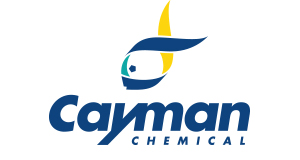PAD4 (human, recombinant)
PAD4 (human, recombinant)
Artikelnummer
CAY10500-100
Verpackungseinheit
100 µg
Hersteller
Cayman Chemical
Verfügbarkeit:
wird geladen...
Preis wird geladen...
Formulation: 50 mM HEPES, pH 8.0, containing 300 mM sodium chloride, 1 mM DTT, and 10% glycerol
Purity: ≥85% estimated by SDS-PAGE
Shelf life (days): 730
Notes: Protein arginine deiminase 4 (PAD4) catalyzes the conversion of arginine residues to citrulline within cellular protein substrates, resulting in the loss of a positive charge, which can alter protein structure and/or function.{45610} It is expressed in neutrophils, as well as a variety of tissues, including the brain, liver, lung, and kidney.{45610,45611,18134} PAD4 has a key role in NETosis, a lytic form of cell death characterized by the release of neutrophil extracellular traps (NETs).{45610} Upon neutrophil activation, PAD4 translocates to the nucleus where it citrullinates histones, initiating chromatin decondensation and the release of NETs.{45611,19778,61223} Neutrophils isolated from Pad4-/- mice exhibit decreased citrullination of histone H3 under both basal and LPS-stimulated conditions and are defective for NET formation in response to stimulation with LPS, phorbol 12-myristate 13-acetate (PMA; Item No. 10008014), or hydrogen peroxide.{19778} Pad4-/- mice exhibit larger lesions than wild-type mice in a model of necrotizing fasciitis induced by M1 group A S. pyogenes lacking the extracellular DNase Sda1. Pad4-deficient mice also exhibit reduced infarct size in a model of myocardial ischemia-reperfusion injury and reduced tumor growth in a Lewis lung carcinoma model.{45612,45611} PADI4 SNPs, including G55S, V82A, and G112A, are associated with rheumatoid arthritis in humans.{59825} Cayman’s PAD4 (human, recombinant) protein contains the G55S, V82A, and G112A SNPs and can be used for enzyme activity assays.
Purity: ≥85% estimated by SDS-PAGE
Shelf life (days): 730
Notes: Protein arginine deiminase 4 (PAD4) catalyzes the conversion of arginine residues to citrulline within cellular protein substrates, resulting in the loss of a positive charge, which can alter protein structure and/or function.{45610} It is expressed in neutrophils, as well as a variety of tissues, including the brain, liver, lung, and kidney.{45610,45611,18134} PAD4 has a key role in NETosis, a lytic form of cell death characterized by the release of neutrophil extracellular traps (NETs).{45610} Upon neutrophil activation, PAD4 translocates to the nucleus where it citrullinates histones, initiating chromatin decondensation and the release of NETs.{45611,19778,61223} Neutrophils isolated from Pad4-/- mice exhibit decreased citrullination of histone H3 under both basal and LPS-stimulated conditions and are defective for NET formation in response to stimulation with LPS, phorbol 12-myristate 13-acetate (PMA; Item No. 10008014), or hydrogen peroxide.{19778} Pad4-/- mice exhibit larger lesions than wild-type mice in a model of necrotizing fasciitis induced by M1 group A S. pyogenes lacking the extracellular DNase Sda1. Pad4-deficient mice also exhibit reduced infarct size in a model of myocardial ischemia-reperfusion injury and reduced tumor growth in a Lewis lung carcinoma model.{45612,45611} PADI4 SNPs, including G55S, V82A, and G112A, are associated with rheumatoid arthritis in humans.{59825} Cayman’s PAD4 (human, recombinant) protein contains the G55S, V82A, and G112A SNPs and can be used for enzyme activity assays.

 English
English








